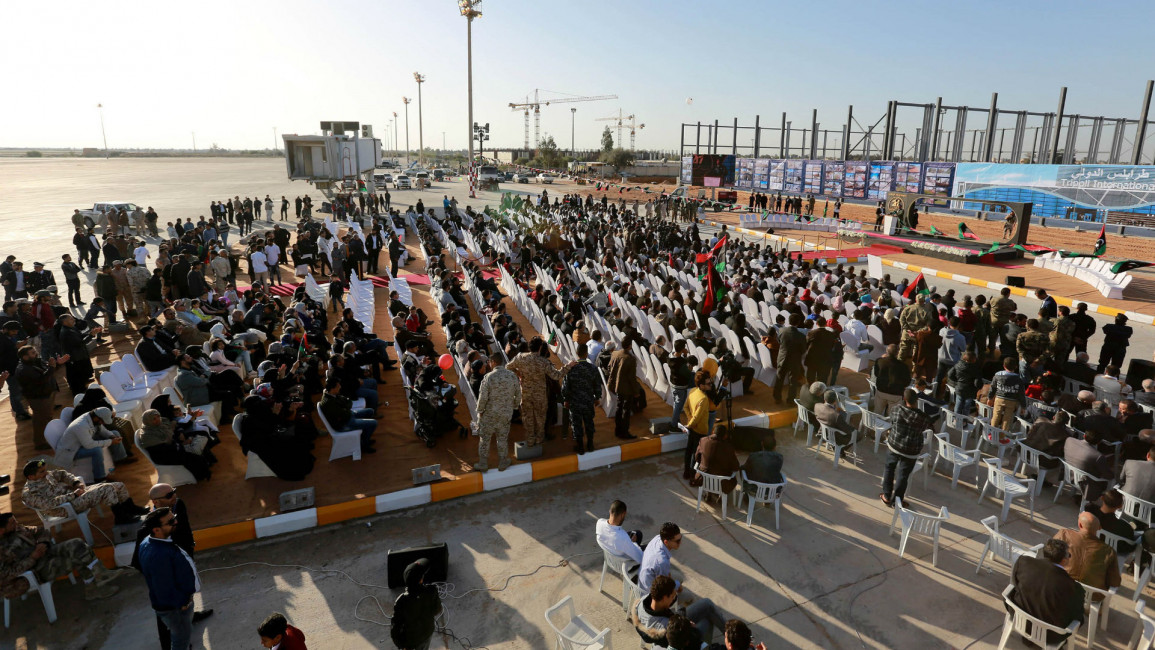Libya's Independence Day 'cancelled' over east Libyan security woes
At least three east Libyan cities cancelled plans for Independence Day celebrations on Friday, as fighting continued to threaten the civilian population.
Tobruk, Benghazi and Baidaa, all under the control of one-time Gaddafi supporter, General Haftar, cited security concerns for not holding celebrations on February 17.
"Celebrations of the anniversary of the February revolt are canceled until all Libyan lands are liberated from the grips of terrorism," said Marwan Younis, spokesperson for the Tobruk city council.
In Benghazi, pictures being shared on social media show that the Freedom Square, an area where gatherings usually centre, remained completely empty on Friday.
Haftar's soldiers are currently engaged in running battles with Islamist fighters in Benghazi and elsewhere. Haftar's forces have been battling IS fighters in a group of 12 blocks of flats in the Ganfouda neighbourhood of south-west Benghazi for months.
The only gathering that did meet in Benghazi on Friday was a small gathering of human rights activists, protesting a recent agreement between Prime Minister Fayez al-Sarraj of the Government of National Accord (GNA) and Italy.
|
||
| Translation: Benghazi's Freedom Square just now |
Ongoing fighting also prevented public gatherings in Baida, with a spokesperson for the town announcing they were "afraid of violence" if they held any celebrations in their town.
"The state of security in our city does not allow for any remembrance - any celebrations are none of our business," the anonymous statement read.
Security concerns are frequently flagged as one of the main barriers towards Libya achieving a return to its previous economic strength.
 |
"We don't have any Muslim Brotherhood native to Libya, they all came to us from Egypt," Haftar said. |  |
Guma al-Gamaty, the head of the Taghyeer Party in Libya, told The New Arab that criminality was increasing in Tripoli, as a lack of central security allowed for the rise of criminal gangs.
"There's been a security breakdown in Tripoli with kidnappings, car thefts and killings on the rise," he said.
"A total lack of police or any effective security has created a security vacuum that militias or other criminal gangs have been allowed to fill."
In the west of the country by comparison, large crowds gathered in Misrata to celebrate, with one large banner reading: "This is where the spark began".
In Tripoli, politicians and other VIPs congregated at the newly reopened airport on Thursday, where a number of speeches were made to mark the occasion, on the anniversary of the 2011 revolts.
"This celebration is a testament to the resistance of the Libyan people," said Khalifa al-Ghawil, prime minister of the General National Congress.
Libya is currently split into two halves, with west Libya controlled by the UN-backed GNA and east Libya largely under the control of General Haftar's Libyan National Army (LNA).
Haftar spoke about his fight against Islamists in an interview with Egypt's ON Live TV on Thursday, scheduled for broadcast on Saturday.
"We don't have any Muslim Brotherhood native to Libya, they all came to us from Egypt," Haftar alleged
.
"[Egypt's] President Sisi's strong hand helped us get rid of the Muslim Brotherhood and the terrorists in Libya."
The Libyan civil war began in February 2011 after a series of protests were brutally suppressed by the regime's security forces, leading to armed rebellion against the regime of long-time leader Colonel Muammar Gaddafi.
The police and army were quickly overpowered by rioting civilians and a number of armed factions took up arms under various banners.
The Gaddafi regime responded to the uprising with brutal tactics, including mass rape and torture and the arbitrary detention of tens of thousands of political prisoners.
Since Gaddafi's gruesome demise at a roadside in October 2011, the central government in Tipoli has failed to maintain national security.
This has led to a long and brutal civil war involving Islamic State fighters, General Haftar's Libyan National Army (LNA) and a myriad other militias that has continued to this day.


